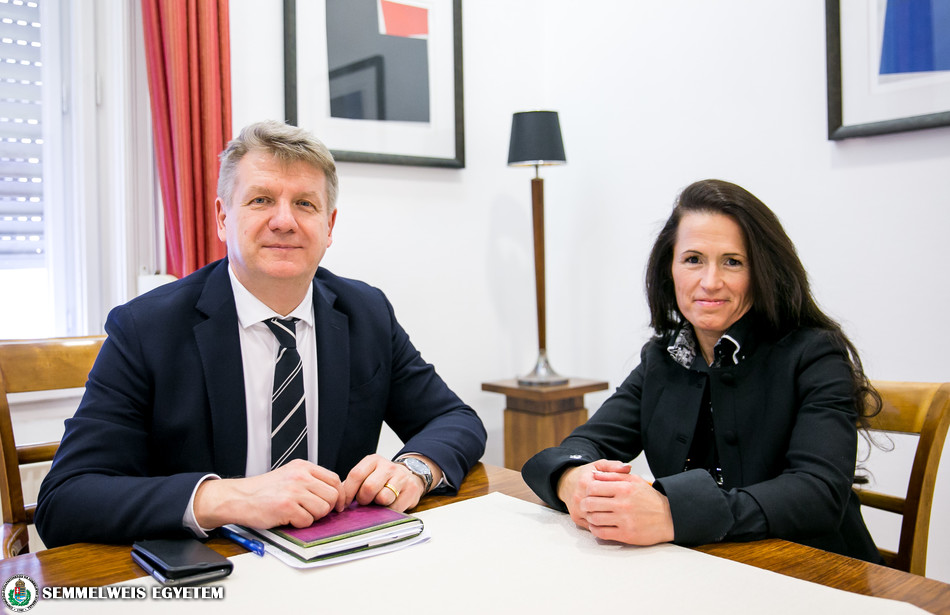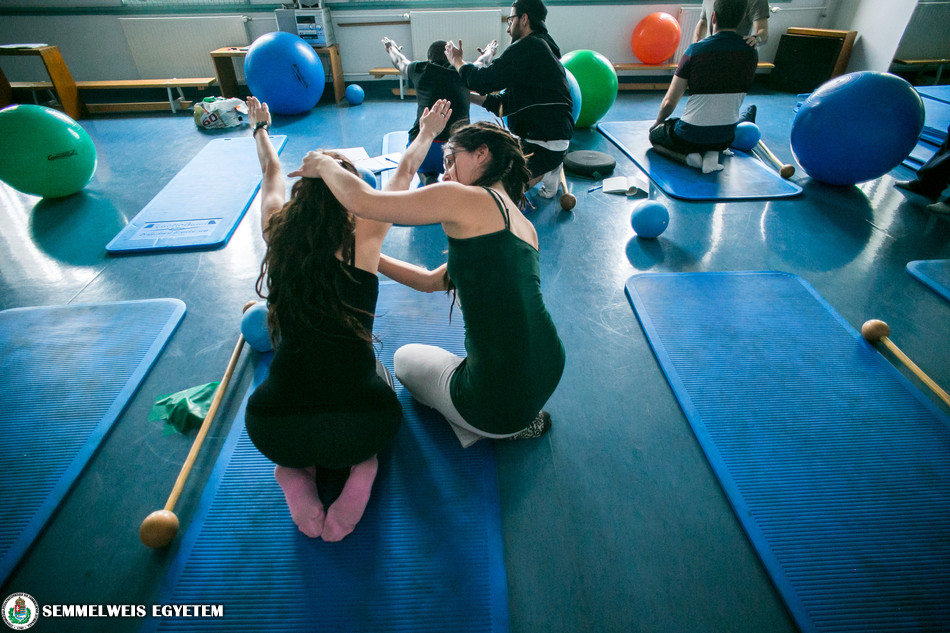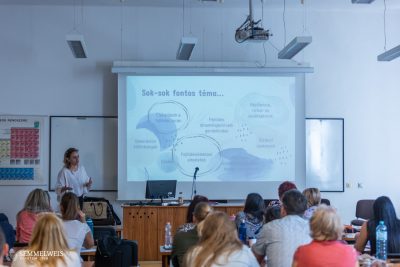The nursing and patient care program’s physiotherapy specialization at Semmelweis University’s Faculty of Health Sciences (ETK) has received the accreditation of the World Confederation for Physical Therapy (WCPT) for a period of five years. WCPT is the highest-level international professional organization in the field of physical therapy, which in addition to various other professional activities also provides accreditation for high-quality university programs, in order to elevate them from the multitude of physical therapy programs. Dr. Zoltán Zsolt Nagy, the dean of ETK, and Dr. Mónika Horváth, the head of the Department of Physiotherapy, talked in an interview about the process and importance of the accreditation.
The World Confederation for Physical Therapy is a world-renowned, prestigious organization that represents more than 450,000 physical therapists through its 109 member organizations, said Dr. Zoltán Zsolt Nagy. It is committed to furthering the physical therapy profession and improving global health through encouraging high standards of physical therapy research, education and practice. To this end, it has set up an accreditation board whose competency it is as the “highest authority” to certify the high-quality physical therapy programs of various countries. “Together with the educators of the Department of Physiotherapy I was convinced that the quality of our program meets the standards of the accreditation, and a few years ago we received confirmation of this from Marilyn Moffatt, the president of WCPT, who said after a visit to the department that the international accreditation of Semmelweis University’s physical therapy program should be started,” said the dean.
 In line with WCPT guidelines, first a 545-page accreditation material had to be put together in English about the program’s staffing, material and infrastructure conditions, as well as its complete professional content. Furthermore, material covering the complete legal background relating to the field of physical therapy had to be compiled, as well as a detailed presentation on the requirements for completing the program, the official professional competencies, the process of approving and renewing the operating registry, and the regulation of postgraduate training requirements, Dr. Mónika Horváth said about the accreditation process. After the International Accreditation Committee accepted the submitted materials, the next step in the process was an on-site visit, the department head added.
In line with WCPT guidelines, first a 545-page accreditation material had to be put together in English about the program’s staffing, material and infrastructure conditions, as well as its complete professional content. Furthermore, material covering the complete legal background relating to the field of physical therapy had to be compiled, as well as a detailed presentation on the requirements for completing the program, the official professional competencies, the process of approving and renewing the operating registry, and the regulation of postgraduate training requirements, Dr. Mónika Horváth said about the accreditation process. After the International Accreditation Committee accepted the submitted materials, the next step in the process was an on-site visit, the department head added.
 During the course of WCPT’s accreditation process, great emphasis is placed on members of the evaluation committee being able to confirm in person that the program is conducted in accordance with the documentation. They can also help the institutions under accreditation with proposals based on their personal impressions – regardless of whether the accreditation is eventually granted or not, said the department head. Two experts (Dr. Margot Skinner and Dr. Graham Pope) representing the Accreditation Committee visited the ETK in November 2018. During the two-day visit, which was organized in accordance with the strict protocols of the accreditation process, committee members observed every aspect of the program. They talked with the dean of the ETK and other faculty leaders, the department’s lecturers, and they checked the staffing conditions of the department, as well as its infrastructure and curriculum. They also met with program organizers and confirmed that the materials submitted previously in writing are executed. They looked at class schedules and also learned about the Neptun and Portal education systems, noted Dr. Mónika Horváth.
During the course of WCPT’s accreditation process, great emphasis is placed on members of the evaluation committee being able to confirm in person that the program is conducted in accordance with the documentation. They can also help the institutions under accreditation with proposals based on their personal impressions – regardless of whether the accreditation is eventually granted or not, said the department head. Two experts (Dr. Margot Skinner and Dr. Graham Pope) representing the Accreditation Committee visited the ETK in November 2018. During the two-day visit, which was organized in accordance with the strict protocols of the accreditation process, committee members observed every aspect of the program. They talked with the dean of the ETK and other faculty leaders, the department’s lecturers, and they checked the staffing conditions of the department, as well as its infrastructure and curriculum. They also met with program organizers and confirmed that the materials submitted previously in writing are executed. They looked at class schedules and also learned about the Neptun and Portal education systems, noted Dr. Mónika Horváth.
They gauged the capacity of the lecture halls and analyzed the professional content of the lectures, then checked out the training rooms, made a professional assessment of the content of the most important preparatory course of physical training (“The functional analysis and examination of the musculoskeletal system”), visited a patient examination class, and also checked the equipment available in the training rooms, she added. Additionally, they also visited a gym class, checking the equipment available and the tools of movement therapy, and looked at all the special rooms used in physical therapist training: the anatomy lab, the physiology lab, the treatment simulation lab, the obstetrics simulation lab, and the biomechanics movement examination lab. Furthermore, they also paid attention to the broader education environment: they visited the library, learning about the opportunities students have to borrow books and use other library services (scientific search systems, electronic periodicals, etc.), and talked with members of the Student’s Union and the Career Office, as well as Hungarian and English-language students from each year.
 Dr. Mónika Horváth also noted that an important step in the accreditation process is presenting the institutions that will accept the students for their clinical practice. Such training sites include the Városmajor Heart and Vascular Center, the Department of Orthopedics, the Department of Anesthesiology and Intensive Therapy, and the Neurology, Ergotherapy, Hydrotherapy and Sports Therapy department of the National Medical Rehabilitation Center.
Dr. Mónika Horváth also noted that an important step in the accreditation process is presenting the institutions that will accept the students for their clinical practice. Such training sites include the Városmajor Heart and Vascular Center, the Department of Orthopedics, the Department of Anesthesiology and Intensive Therapy, and the Neurology, Ergotherapy, Hydrotherapy and Sports Therapy department of the National Medical Rehabilitation Center.
The visit to the faculty was followed by several months of evaluation work, and the process resulted in a very detailed assessment covering many aspects, Dr. Zoltán Zsolt Nagy said. The 47-page detailed assessment and the summary certification, as well as the accreditation diploma itself, arrived in February, and the program was found to be mostly excellent based on the evaluation criteria. The accreditation certificate states that Semmelweis University’s physical therapy Bachelor of Science program has been awarded the WCPT’s accreditation, which of course means that in the future we can also use WCPT’s accreditation logo in all our communication materials, the dean said. The certificate is awarded for 5 years, when a new review will be conducted in order to ensure further development and that the quality has remained high. The dean emphasized that the accreditation is important especially from the viewpoint of English-language physical therapy training, as the program’s international accreditation makes the diploma acceptance process in other countries much simpler.
Source: Faculty of Health Sciences
Translation: Tamás Deme
Photo: Attila Kovács – Semmelweis University


